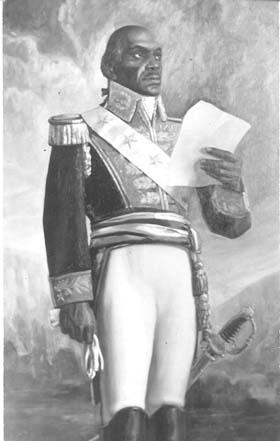
April 7, 2008
Toussaint L'Ouverture, the Precursor
A CubaNews translation. Edited by
Walter Lippmann.
http://granma.co.cu/2008/04/07/nacional/artic01.html
 From
France, the 1789 Revolution presented the rest of the world with its paradigm of
liberty, equality and fraternity. The new winds blowing across the Old Continent
traveled all the way to the island of Hispaniola, then under French rule. Led by
Boukman, the slaves from the French side revolted in August 1791. Shortly after,
Toussaint Louverture became the main leader of the insurrection.
From
France, the 1789 Revolution presented the rest of the world with its paradigm of
liberty, equality and fraternity. The new winds blowing across the Old Continent
traveled all the way to the island of Hispaniola, then under French rule. Led by
Boukman, the slaves from the French side revolted in August 1791. Shortly after,
Toussaint Louverture became the main leader of the insurrection.
His African grandfather taught him to read and write while Toussaint worked as a
driver for the estate’s owner.
He learned his military skills in the Spanish army, but when he realized Spain’s
only purpose was to destabilize the French without abolishing slavery, he rose
up against his former chiefs, achieving the grades of Major General in 1796.
Wherever he went, he would free the slaves and urge people to render the
plantations active again.
The fight against Britain –also deployed on the island’s French side– was much
more difficult, but he finally secured control over the colony and expelled the
British armies in 1798.
While governor of Saint Domingue, he was captured by general Leclerc in 1802 and
shipped to France, where he was put in prison.
One major figure of the Revolution, L'Ouverture died on April 7, 1803. However,
on January 1, 1804, Jean-Jacques Dessalines proclaimed the independence of
Haiti. (SE)

7 de abril 2008
http://granma.co.cu/2008/04/07/nacional/artic01.html
Louverture, el Precursor
 Desde
Francia, la Revolución de 1789 lanzaba su paradigma de libertad, igualdad y
fraternidad al resto del mundo. Hasta el actual Haití, territorio dominado
entonces por la nación europea, llegaron los aires nuevos del Viejo Continente.
En agosto de 1791, esclavos de la parte francesa de La Española, capitaneados
por Boukman, se rebelaron. Tiempo después Toussaint Louverture se convertía en
el principal líder de los insurrectos.
Desde
Francia, la Revolución de 1789 lanzaba su paradigma de libertad, igualdad y
fraternidad al resto del mundo. Hasta el actual Haití, territorio dominado
entonces por la nación europea, llegaron los aires nuevos del Viejo Continente.
En agosto de 1791, esclavos de la parte francesa de La Española, capitaneados
por Boukman, se rebelaron. Tiempo después Toussaint Louverture se convertía en
el principal líder de los insurrectos.
Su abuelo había venido de
África y Toussaint aprendió a leer y a escribir mientras su dueño hacía de él su
chofer en la hacienda.
En la cuestión militar, fue
entrenado por los españoles. Cuando entendió que España solo pretendía
desestabilizar a los franceses, pero no abolir la esclavitud, se rebeló y
derrotó a sus antiguos jefes. Fue ascendido a General de División en 1796.
Por donde él pasaba,
confirmaba la emancipación de los esclavos e instaba a que las plantaciones se
pusieran en marcha nuevamente.
La pelea contra los
británicos, también en el lado francés de la isla, fue más difícil; pero en 1798
tuvieron que abandonar La Española.
Toussaint, que llegó a ser
gobernador de Saint Domingue, fue capturado por el general Leclerc en 1802 y
enviado a Francia. Allá sería encarcelado.
Aunque Louverture, una de las
figuras más importantes de la Revolución, moría el 7 de abril de 1803,
Jean-Jacques Dessalines proclamaba, el 1 de enero de 1804, la independencia de
Haití. (SE)

 From
France, the 1789 Revolution presented the rest of the world with its paradigm of
liberty, equality and fraternity. The new winds blowing across the Old Continent
traveled all the way to the island of Hispaniola, then under French rule. Led by
Boukman, the slaves from the French side revolted in August 1791. Shortly after,
Toussaint Louverture became the main leader of the insurrection.
From
France, the 1789 Revolution presented the rest of the world with its paradigm of
liberty, equality and fraternity. The new winds blowing across the Old Continent
traveled all the way to the island of Hispaniola, then under French rule. Led by
Boukman, the slaves from the French side revolted in August 1791. Shortly after,
Toussaint Louverture became the main leader of the insurrection.